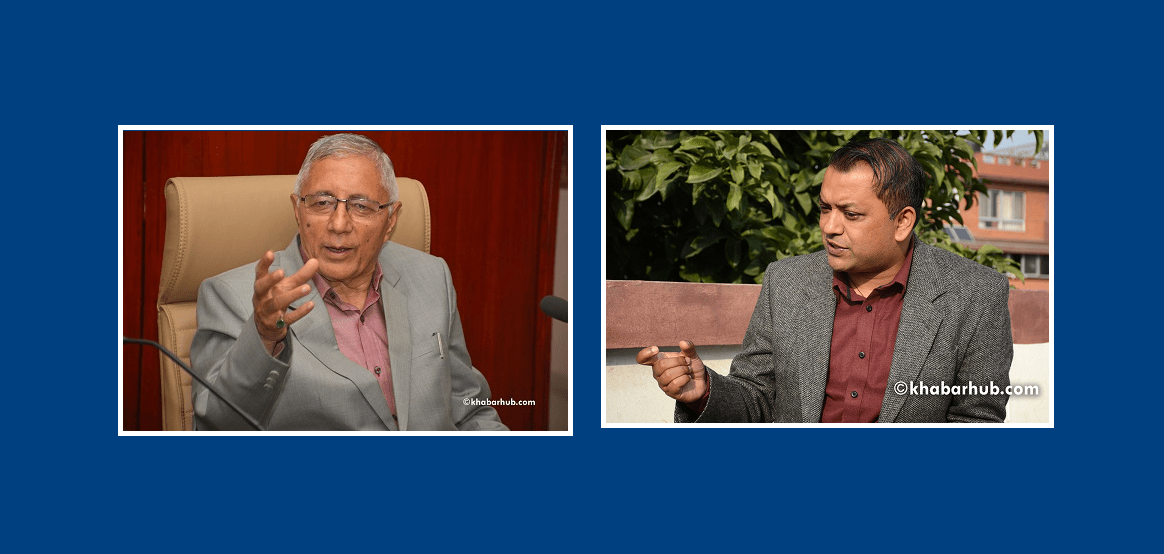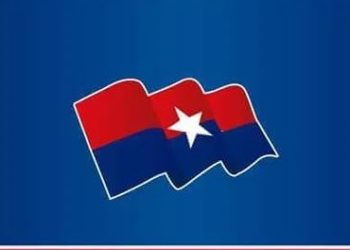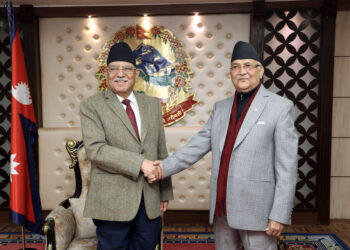KATHMANDU: Once hailed as the political heir to Dr. Shekhar Koirala, Nepali Congress (NC) General Secretary Gagan Kumar Thapa has not held a single meaningful meeting with him since July, multiple sources claimed.
In a striking turn of events over the past nine months, Thapa has instead gravitated toward NC President Sher Bahadur Deuba, forging a noticeably stronger alliance.
For nine long months, the two leaders—once bonded by a shared mission to challenge the establishment—haven’t held a single meaningful dialogue, insiders reveal.
What was once a bond forged in shared ambition has now dwindled to little more than curt nods and polite greetings at party gatherings.
The fracture between Shekhar and Gagan—once united as presidential and General Secretary hopefuls from the same faction in the last General Convention—first surfaced during the contest for parliamentary leadership.
While Shekhar has gone full throttle, touring districts and openly declaring his candidacy for party president in the upcoming 15th General Convention, Thapa has taken a more understated approach—holding quiet consultations with grassroots leaders and carefully gauging the political terrain.
The crack has deepened into a visible rift, with both camps confirming a steady deterioration in their relationship.
Instead, Thapa has gradually gravitated toward NC President Sher Bahadur Deuba, forming an increasingly evident political alignment.
What was once a dynamic alliance has now faded into formality—reduced to polite exchanges and hollow greetings at party functions.
Their relationship, once defined by unity during the 14th General Convention where Shekhar ran for president and Gagan for general secretary from the same camp, began to unravel during the battle for parliamentary leadership.
The rift only deepened following the formation of a Congress-UML coalition that saw KP Sharma Oli return as Prime Minister.
As the two parties negotiated ministerial appointments, cracks widened within the Shekhar-Gagan camp. Congress was promised 11 ministerial positions, but the Deuba-led camp finalized just eight.
Disagreements flared as Shekhar and Gagan vied to place their own loyalists in the few remaining slots.
In the end, Shekhar managed to get two of his preferred candidates—Badri Pandey and Ramnath Adhikari—into the cabinet. Gagan, meanwhile, was left with just one: Pradeep Poudel. The imbalance fueled resentment, turning a simmering tension into a cold war.
In the shifting tides of Nepali Congress politics, the once united front of Shekhar and Gagan has now become a tale of two ambitions—each racing toward the same peak, but on diverging paths.
Since the debacle, there’s been radio silence between the two. Even when Shekhar called a gathering of party office-bearers in Baluwatar, Gagan was a no-show—reportedly engaged in a pre-scheduled program outside Kathmandu. Though his absence was explained, it only reinforced speculation of an ongoing fallout.
When pressed by media, Thapa offered a diplomatic answer: “Until the 15th General Convention, Dr. Shekhar Koirala and I were on the same side. I still see myself there. Whether he chooses to remain there is up to him.” His words, though respectful, hinted that the two no longer walk the same path.
Still, Thapa acknowledged Koirala’s stature: “He is a leader today and will remain one tomorrow.”
While Shekhar has gone full throttle, touring districts and openly declaring his candidacy for party president in the upcoming 15th General Convention, Thapa has taken a more understated approach—holding quiet consultations with grassroots leaders and carefully gauging the political terrain.
But those close to both men say the split is real—and likely permanent. One leader bluntly said, “There’s no chance they’ll contest for different positions. All signs point to a direct face-off for the presidency.”
In the shifting tides of Nepali Congress politics, the once united front of Shekhar and Gagan has now become a tale of two ambitions—each racing toward the same peak, but on diverging paths.









Comment